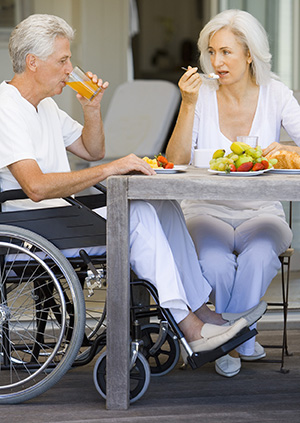Good nutrition is a vital part of staying as healthy as possible after a spinal cord injury (SCI). A nutritious and balanced diet helps you manage your weight. It provides you with the energy you need for daily activities. It helps keep your body strong and reduces your risk for certain health problems. For these reasons and more, it’s important to eat well every day. Your healthcare team will work with you to make a plan for healthy eating. It’s up to you to put that plan into action.
How good nutrition helps
Eating nutritious foods supports good health in many ways. It can help you:
-
Manage your weight. After an SCI, your body will burn calories more slowly than it did before. So, you'll need to adjust what and how much you eat to prevent becoming overweight. Staying at a healthy weight helps keep your body as healthy as possible. It also improves mobility, so you can do more tasks on your own. Eating healthy is one of your best tools for managing your weight.
-
Prevent complications. With an SCI, you have a greater risk of developing skin sores called pressure injuries. Nutritious foods (especially foods high in protein) help keep skin healthy and help make pressure injuries less likely. Good nutrition also plays a role in preventing other issues, such as diarrhea, constipation, and loss of calcium in your bones (osteoporosis).
A plan that works for you
After an SCI, your body’s needs change in many ways. That includes how it uses the food you eat. You don’t have to go on a special diet. But you do need to choose the right kinds of foods and in the right amounts. Your healthcare team will help you create a plan for healthy meals and snacks. In some cases, you may work with a specialist, such as a nutritionist or registered dietitian. Your basic goals are to:
-
Eat a variety of foods. By including different types of foods in your diet, you can make sure you’re getting the nutrients you need to stay healthy. When planning meals, choose whole grains, fruits, and vegetables. Also choose a variety of protein foods, such as lean meats, eggs, legumes (nuts and beans), and low- or nonfat dairy products.
-
Limit foods high in fat and sugar. These foods tend to be high in calories, making weight gain more likely. High-fat foods can also increase your risk for heart disease.
-
Eat foods high in fiber. Fiber adds bulk to stool, making it easier to pass. This helps prevent bowel problems, such as blockage and constipation. Foods such as whole grains, fruits, and vegetables are all good sources of fiber.
-
Limit your salt intake. Too much salt can raise your blood pressure. It can also cause you to retain more water. This can cause swelling and bloating.
-
Drink plenty of fluids. Having enough water and other fluids helps your body work correctly. It can also help prevent problems, such as constipation and urinary tract infections.
-
Limit how much alcohol you drink. Alcohol contains calories but no nutrition. And it can also change the way the body absorbs nutrients. If you like to drink alcohol, talk to your healthcare provider about what limits are right for you.
A lifelong goal
Try to make good food choices every day. This will help you take active control of your health. And it will help you be as mobile and independent as you can. Look to your healthcare team for help when you need it. If you have questions, concerns, or just need support, your team is there to help you.


